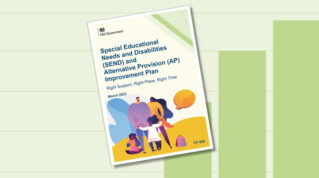I’ll say what others are thinking. The disconnect between schools policy and SEND strategy has given the lie to 30 years of inclusion rhetoric, flies in the face of logic, feeds unremitting concerns about the High Needs Budget – and it’s hell for families. Whatever the achievements of Nick Gibb’s era, the schism continued. Quality First Teaching? Every teacher a teacher of SEND? Whole-school SEND? Not unless we have whole-school policy.
The forthcoming SEND Review consultation aims to strengthen the inclusive duties of mainstream schools and reduce the number of appeals to the SEND tribunal. We’ve been here before. A 2006 select committee report on SEN strategy claimed funding had continued to increase (£4.5 billion then; it’s double that now in cash terms), 92 per cent of plans for children were drafted on time and there had been a nine per cent reduction in tribunal appeals. The successes were short-lived, standards were still low, and the next government legislated again. That’s the template…
Unless I’m very much mistaken, this new review will fail to achieve any of its aims for the simple reason that government continues to sandbox SEND. For career politicians, it’s a stepping stone to more prominent positions. Only Ed Timpson has distinguished himself in the role; but as Ofsted/CQC report, his Children and Families Act legacy is deeply mired by the failure of local authorities to implement it, failure that leaves both families and schools without essential services.
Symptomatically, the DfE’s SEND review of this slow progress has itself taken three years and counting – an ambivalence that makes SEND look like one of Kirsty and Phil’s Love It or List It projects: remember the one where a woman had far too many mugs? That’s the one that comes to mind.
We’ve reached peak dysfunction
I served five years as a local authority SEND manager in the late 1990s, so I’m pretty accustomed to the kinds of nonsense, intimidation, deception and routine stalling that go on in SEND. But we’ve reached peak dysfunction: recently, I received a local authority email at midnight. People are working all hours and either they do know what they’re doing or they don’t; but they, like the children and the schools too, are caught in a maelstrom of politics, management and plain shenanigans.
I remember me back then, doing the LA job, probably just the person you imagine. I got pissed off with the silo-thinking, the policies without evidence, the knee-jerk strategies and went into PRU leadership for three years followed by 15 years as a mainstream SENCO. Whether things are any better or worse now (debatable on many levels), it is what it is. The people working in it may be good or they may be bad but it’s a bad gig.
We need better: for families, for schools, for society. We need better than we’ll get in the review consultation, a piece of puppet theatre with strings attached to every question. We should mobilise and re-write the consultation on our own terms. To that end, here are some low-to-no-cost things we should be thinking about:
- Protect SENCO time but allow trusts greater flexibility over their role.
- Review the quality of SENCO training and develop a specialist pathway.
- Task the children’s commissioner with reporting annually on a levelling-up agenda for SEND.
- Introduce regional commissioning to level up the quality and choice of specialist provision.
- Release maintained specialist schools and AP settings from the current place funding formula to improve quality and respond to demand.
- Raise young people’s voices in the setting of their own EHCP outcomes and allow them or their parents the right of appeal.
- Amend the SEND regulations to ensure the information schools publish is current and evidence-based and to reflect the recent High Court decision on annual review timescales.
Of course, we might be accused of delaying the process ourselves by rallying around a genuine consultation and evidence-based outcomes. But if the alternative is just more of the same, then what do we have left to lose?
















Your thoughts